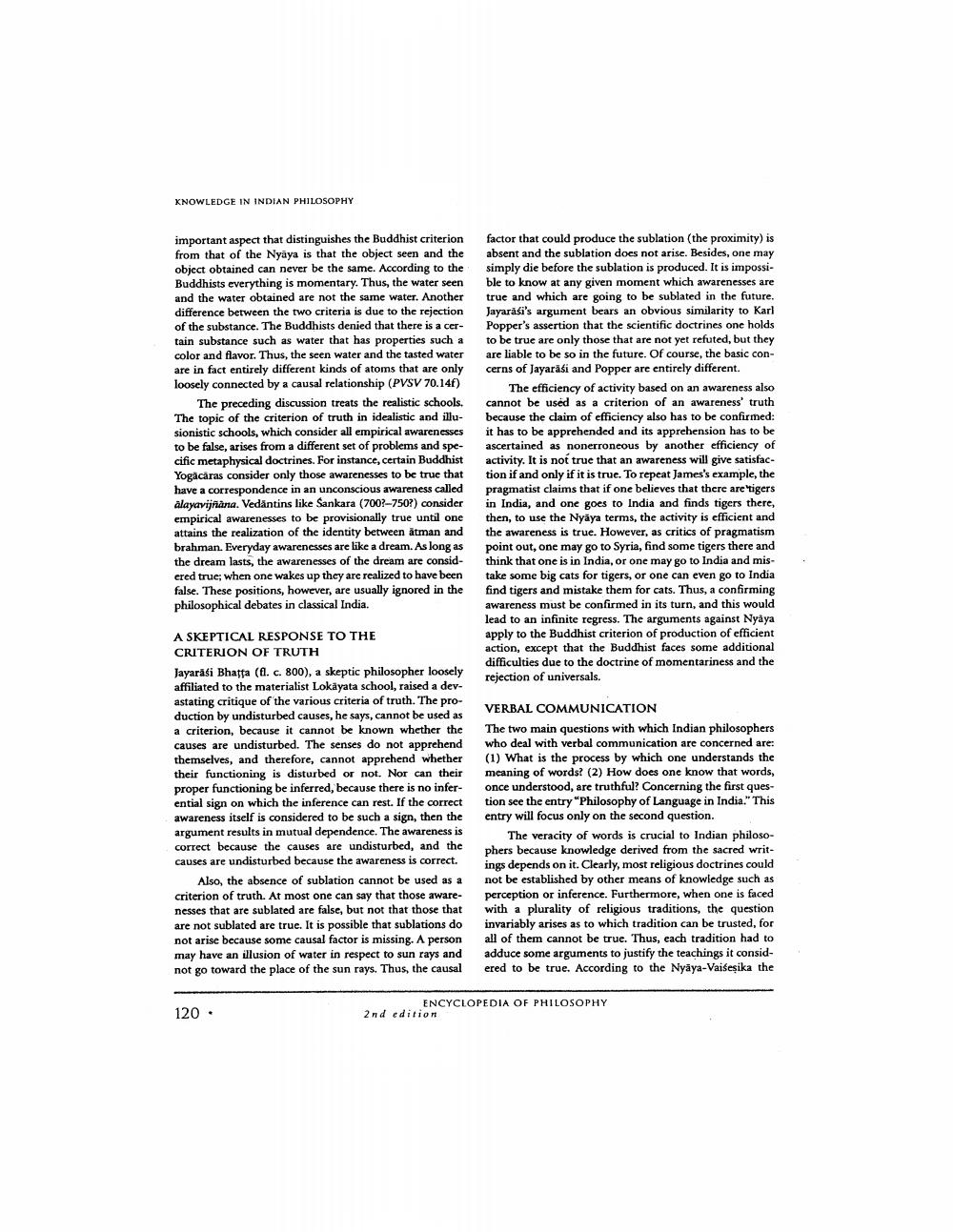Book Title: Knowledge In Indian Philosophy Author(s): Publisher: View full book textPage 6
________________ KNOWLEDGE IN INDIAN PHILOSOPHY important aspect that distinguishes the Buddhist criterion from that of the Nyaya is that the object seen and the object obtained can never be the same. According to the Buddhists everything is momentary. Thus, the water seen and the water obtained are not the same water. Another difference between the two criteria is due to the rejection of the substance. The Buddhists denied that there is a certain substance such as water that has properties such a color and flavor. Thus, the seen water and the tasted water are in fact entirely different kinds of atoms that are only loosely connected by a causal relationship (PVSV 70.14f) The preceding discussion treats the realistic schools. The topic of the criterion of truth in idealistic and illusionistic schools, which consider all empirical awarenesses to be false, arises from a different set of problems and specific metaphysical doctrines. For instance, certain Buddhist Yogacaras consider only those awarenesses to be true that have a correspondence in an unconscious awareness called alayavijnana. Vedantins like Sankara (700?-750?) consider empirical awarenesses to be provisionally true until one attains the realization of the identity between atman and brahman. Everyday awarenesses are like a dream. As long as the dream lasts, the awarenesses of the dream are considered true; when one wakes up they are realized to have been false. These positions, however, are usually ignored in the philosophical debates in classical India. factor that could produce the sublation (the proximity) is absent and the sublation does not arise. Besides, one may simply die before the sublation is produced. It is impossible to know at any given moment which awarenesses are true and which are going to be sublated in the future. Jayarasi's argument bears an obvious similarity to Karl Popper's assertion that the scientific doctrines one holds to be true are only those that are not yet refuted, but they are liable to be so in the future. Of course, the basic concerns of Jayarasi and Popper are entirely different. The efficiency of activity based on an awareness also cannot be used as a criterion of an awareness' truth because the claim of efficiency also has to be confirmed: it has to be apprehended and its apprehension has to be ascertained as nonerroneous by another efficiency of activity. It is not true that an awareness will give satisfaction if and only if it is true. To repeat James's example, the pragmatist claims that if one believes that there are tigers in India, and one goes to India and finds tigers there, then, to use the Nyaya terms, the activity is efficient and the awareness is true. However, as critics of pragmatism point out, one may go to Syria, find some tigers there and think that one is in India, or one may go to India and mistake some big cats for tigers, or one can even go to India find tigers and mistake them for cats. Thus, a confirming awareness must be confirmed in its turn, and this would lead to an infinite regress. The arguments against Nyaya apply to the Buddhist criterion of production of efficient action, except that the Buddhist faces some additional difficulties due to the doctrine of momentariness and the rejection of universals. VERBAL COMMUNICATION A SKEPTICAL RESPONSE TO THE CRITERION OF TRUTH Jayarasi Bhatca (fl. c. 800), a skeptic philosopher loosely affiliated to the materialist Lokayata school, raised a devastating critique of the various criteria of truth. The production by undisturbed causes, he says, cannot be used as a criterion, because it cannot be known whether the causes are undisturbed. The senses do not apprehend themselves, and therefore, cannot apprehend whether their functioning is disturbed or not. Nor can their proper functioning be inferred, because there is no inferential sign on which the inference can rest. If the correct awareness itself is considered to be such a sign, then the argument results in mutual dependence. The awareness is correct because the causes are undisturbed, and the causes are undisturbed because the awareness is correct. Also, the absence of sublation cannot be used as a criterion of truth. At most one can say that those awarenesses that are sublated are false, but not that those that are not sublated are true. It is possible that sublations do not arise because some causal factor is missing. A person may have an illusion of water in respect to sun rays and not go toward the place of the sun rays. Thus, the causal The two main questions with which Indian philosophers who deal with verbal communication are concerned are: (1) What is the process by which one understands the meaning of words? (2) How does one know that words, once understood, are truthful? Concerning the first question see the entry "Philosophy of Language in India." This entry will focus only on the second question. The veracity of words is crucial to Indian philosophers because knowledge derived from the sacred writings depends on it. Clearly, most religious doctrines could not be established by other means of knowledge such as perception or inference. Furthermore, when one is faced with a plurality of religious traditions, the question invariably arises as to which tradition can be trusted, for all of them cannot be true. Thus, each tradition had to adduce some arguments to justify the teachings it considered to be true. According to the Nyaya-Vaisesika the 120 ENCYCLOPEDIA OF PHILOSOPHY 2nd editionPage Navigation
1 ... 4 5 6 7 8 9
